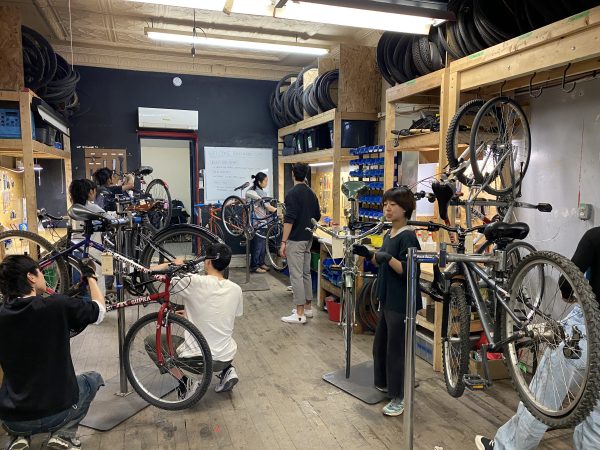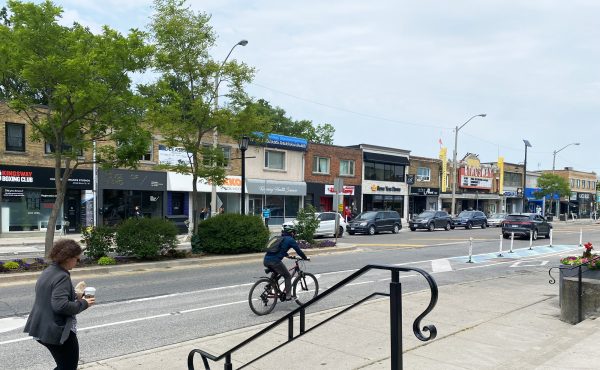Last week, Bike Share Toronto reported a record-breaking 980,000 rides in June. The most ever in a single month. Toronto is inching closer to a one-million-ride milestone, and it’s clear: people want to cycle. But as we encourage more residents to swap steering wheels for handlebars, a critical piece of our cycling ecosystem remains unacknowledged and unsupported: the skilled hands that keep those bikes rolling safely.
While we celebrate this ridership boom, the very people who maintain the machines underpinning our shift to active, low-emission travel remain invisible in the eyes of our federal workforce strategy. Canada still doesn’t officially recognize bicycle mechanics as a national occupation. And that has to change.
The Hidden Workforce Behind a Greener City
It might surprise you to learn that bicycle mechanics do not appear in Canada’s National Occupation Classification (NOC) system. Despite being the national framework that guides employment insurance, job training, and immigration, the NOC has no standalone code for this essential profession. That means no clear pathway for federal training programs, no data for employers to build a stable workforce, and no formal recognition for workers.
As a result, bicycle mechanics, many of whom are young, racialized, or newcomers, are often miscategorized under broader titles like “Retail Salespersons” or “Other Repairers and Servicers.” This is a structural barrier that hinders workforce development, suppresses wages, and ultimately compromises public safety.
An Echo in the Green Economy: A System-Wide Problem
The failure to recognize bicycle mechanics is not an isolated oversight; it is a symptom of the exact systemic gaps that Toronto’s own green economy leaders are struggling to close. In a June 2023 webinar on advancing the TransformTO strategy, a panel of experts from industry, education, and policy convened to discuss the immense challenge of building a workforce for the green economy. Their conclusions create a powerful echo that validates the urgent need to professionalize this specific trade.
The panelists spoke of a massive “skills gap” and the critical need to create new, clear training pathways for the green-collar jobs of the future. They stressed that success requires a deliberate, collaborative effort to define, train, and support the necessary workforce. This high-level discussion perfectly diagnosed the problem, and one of the event’s own organizers and panel moderators is now leading the charge on the solution.
That leader is Rob McMonagle. As the former Sector Development Officer for the City of Toronto’s Economic and Culture Division since 2011, McMonagle has been instrumental in introducing initiatives to accelerate the city’s green sectors. His decades-long career, from founding one of Canada’s first renewable energy companies in 1980 to helping create the nation’s first Feed-in Tariff program, gives him an unparalleled view of the gap between policy goals and practical implementation. He understands that for Toronto to succeed, we must build the workforce from the ground up.
The Toronto Context: A System Under Strain
Here in Toronto, we’re riding on a fragile assumption: that the people fixing our bikes and a growing fleet of complex e-bikes will always be around, available, and properly trained. That assumption does not hold up to scrutiny.
According to the City of Toronto’s 2022 Bike Industry Consultations Report, workforce issues were identified as one of five urgent strategic priorities for the sector, alongside safety, market growth, supply chain resilience, and industry capacity building. Employers across Toronto noted immense challenges in attracting and retaining qualified talent, with a particular shortage of certified training programs.
The same report notes that community bike hubs like Charlie’s Freewheels, Bike Sauce, and Bike Chain at the University of Toronto, could become crucial training grounds and workforce pipelines, if only a formal occupational pathway were established. But without official recognition, these efforts remain informal, underfunded, and limited in scale. Toronto has long pitched itself as a green jobs hub, but how can we champion the green economy when we can’t even define one of its most vital roles?
A Global Outlier in a Policy Vacuum
Canada is increasingly out of step with the rest of the world. The United States, the United Kingdom, Australia, New Zealand, and most European Union countries have formal occupational codes for bicycle mechanics.
- United States
- Code & Title: 49-3091 Bicycle Repairers
- United Kingdom
- Code & Title: 5231 Vehicle Maintenance and Repair Occupations (This group includes a specific entry for “Bicycle Repairer”).
- Australia and New Zealand
- Code & Title: 323312 Bicycle Mechanic
- European Union
- Title: Bicycle mechanic
These codes underpin training certifications, fair wage standards, and clear career pathways. The U.S. Bureau of Labor Statistics, for example, recognizes “Bicycle Repairers” with specific data on median income, growth projections, and professional standards.
By contrast, Canadian bicycle mechanics operate in a policy vacuum, even as our governments invest billions in bike lanes, e-bike incentives, and Bike Share expansions. It’s contradictory to invest public dollars to get more people on bikes while systemically ignoring the workforce required to maintain them safely.
Safety Starts With Standards
Cycling safety is too often reduced to debates over helmets and road design. But safety also depends on well-maintained equipment, especially with the growing number of pedal-assist bikes and heavy e-cargo bikes hitting Toronto streets. When a brake fails, a frame cracks, or an e-bike battery shorts out, it’s not just a service issue; it’s a public safety risk.
A standardized occupation code would enable national training programs, technician certifications, and updated safety protocols that match the complexity of today’s cycling technology. Failing to professionalize bicycle maintenance is a system failure, one we can, and must, fix.
Toward Recognition: A National Submission
This past June, a coalition of advocates took a crucial step, spearheaded by Rob McMonagle in his advisory role with the Bike Training Collective Canada. Supported by stakeholders including Cycle Toronto and the Canadian Independent Bicycle Retailers Association, the group submitted a formal application to Employment and Social Development Canada (ESDC), requesting the creation of a distinct NOC code for bicycle mechanics. You can read the full submission, Proposed New Occupation Code for Bicycle Mechanics in the National Occupational Classification System, here.
The Bike Training Collective has also published a dedicated advocacy page that breaks down the proposal, highlights the need for national recognition, and includes a link to the official petition. With stakeholder-led changes to the NOC rarely adopted without broad public support, the petition aims to show the depth of industry and community backing behind this essential shift.
What Toronto Can Do Now
Though this is a federal issue, Toronto can lead by example, and we already have the blueprint.
The City’s Growing Green Industry Collaboration report, produced with Foresight Canada, calls for robust workforce development as a key part of Toronto’s TransformTO Net Zero Strategy. It highlights that sustainable transportation is one of the five core sectors of our green economy, employing over 23,000 people in Toronto as of 2019, more than any other green subsector. Bicycle mechanics are a vital, yet unrecognized, part of that workforce.
The city can take immediate action:
- Formally Endorse the Submission: City Council, through the Infrastructure and Environment Committee, should publicly endorse the petition and send a formal letter of support for the new NOC code to the federal government.
- Fund Skills Training: Invest directly in skills training at our invaluable community bike hubs, like Bike Pirates, Gateway Bike Hub, and Scarborough Cycles, turning them into official pre-apprenticeship pipelines.
- Create Green Career Pathways: Launch a Green Career Pathways Program that explicitly includes bicycle mechanics alongside solar installers, EV technicians, and building retrofitting experts. You can use TRCA’s Newcomer Youth Green Economy Project as a template.
- Partner with Education: Work with the TDSB and colleges like George Brown or Centennial to pilot co-operative programs in bicycle technology, e-bike maintenance, and micro-mobility systems.
These types of career ladders not only support climate action but also offer equitable access to good jobs. Many community bike programs already center equity by hiring youth, newcomers, and those facing employment barriers.
Let’s Build the Industry We Deserve
We could be on the verge of a cycling renaissance in Toronto, one that deserves a professional and respected workforce behind it. That means not just building lanes, but building livelihoods. It means training the next generation of mechanics, technicians, and community educators. It means giving people the tools to fix not just their bikes, but their futures.
The transformation is already underway on our streets. But without federal recognition, we’re pedaling uphill with the brakes on. Let’s fix that.
Photo by Lanrick Bennett




